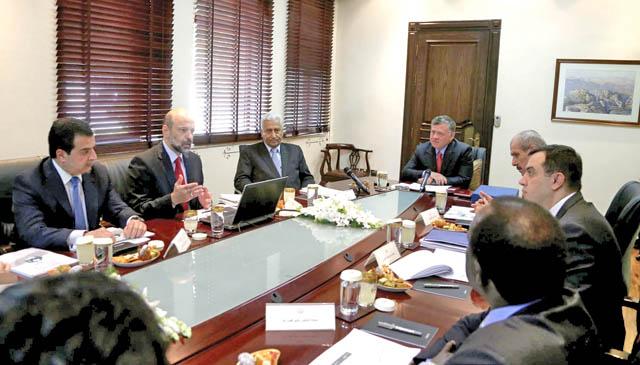You are here
Privatisation panel highlights transparency of mission
By Omar Obeidat - Apr 01,2014 - Last updated at Apr 01,2014
AMMAN – Head of the Privatisation Evaluation Committee Omar Razzaz on Tuesday said that the panel –– through its recent report –– did not aim at ending the controversy surrounding the transfer of some state-owned properties to the private sector, but to present facts to the public.
“We are not seeking to make all read on the same page, but rather to present facts to the public,” Razzaz said at a press conference, just two days after the release of the committee’s report of findings and recommendations that was presented to His Majesty King Abdullah and the government.
He reiterated that the committee based its assessment of the privatisation process on facts and figures as well as a thorough examination of a large number of documents related to the privatisation process that started over two decades ago.
The committee was formed in March last year, upon a Royal directive to Prime Minister Abdullah Ensour, comprising a group of local and international experts in the field of economic and social policies who were tasked with assessing privatisation policies and transactions.
The report reviewed the privatisation of 19 companies which used to be owned by the government in the fields of mining, telecommunications, aviation, water and electricity.
He pointed out that there were some legal violations in some of the transactions, particularly in the phosphate company deal as officials at that time followed direct negotiations with one investor without inviting tenders from various investors.
However, Razzaz said that the privatisation programme had also boosted the performance of the companies and created more jobs for Jordanians.
He said that the report criticised the transfer of the government’s shares in certain sectors, especially in mining and cement, adding that keeping strategic stocks in these firms would have prevented monopoly.
“The most important issue is that authorities follow up on the findings of the report and to be transparent with the public when they consider future deals,” he said.
Hiding information and facts from the public had created a state of uncertainty and scepticism among average citizens regarding the privatisation process, Razzaz added.
According to the panel’s chairperson, revenues generated from privatisation reached JD1.7 billion, of which around JD1.5 billion went to paying the Kingdom’s debts.
On Sunday, King Abdullah stressed the importance of building on the outcome of the committee report by utilising its results in drawing up economic strategies, and boosting the partnership between the public and the private sectors.
During a meeting with the panel’s members, attended by Ensour, the King commended the committee’s efforts, stressing that the government should conduct an in-depth study of the report to assess the reality on the ground.
The government should adopt the panel’s recommendations as it devises future strategies, in accordance with the directives appearing in the Royal letter to the premier on Saturday, the King said, referring to a letter in which His Majesty directed the government to draw up a clear 10-year plan for economic revival.
Related Articles
His Majesty King Abdullah on Sunday stressed the importance of building on the outcome of the Privatisation Evaluation Committee (PEC) report by utilising its results in drawing up economic strategies, and boosting the partnership between the public and the private sectors.
The Lower House lost quorum on Sunday in the Chamber’s last meeting of the ordinary session, with MPs failing to discuss the Privatisation Evaluation Committee’s report.
The absence of transparency, information and facts for the public about the privatisation experience since its beginning has created an air of uncertainty and scepticism around the whole process, head of the Privatisation Evaluation Committee Omar Razzaz said on Tuesday.












